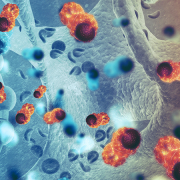2020 vision: genomic predictions for the year ahead
Three wise women and men ponder the question of what might be in store in the world of genomics this year
With genomics firmly embedded in the NHS long term plan and very much a focus within healthcare, what do the experts think 2020 has in store? We asked three friends of the programme for their predictions for an exciting year ahead.
 Professor Anneke Lucassen: Improved clarity and understanding
Professor Anneke Lucassen: Improved clarity and understanding
My prediction for 2020 is that both the benefits and the limitations of genomic medicine will be clearer to health professionals, patients and the public. We have much to learn still about how and when a genome sequence is best interpreted for a particular person.
I predict that expectations about genomics will become more realistic with an appreciation that its role in diagnosis of rare diseases, or treatment decisions for cancers, is different from its role in predictions of future diseases in healthy individuals. The latter is often much less accurate than many expect so I hope there will be a greater understanding of the shades of grey involved in genomic medicine.
Anneke is professor of clinical genetics within medicine at the University of Southampton and honorary consultant in clinical genetics in Wessex.
Dr Tom Fowler: Prioritisation of education and 
mainstreaming
Genomics will definitely be at the forefront of innovation in healthcare this year. There is increasing investment in genomics via the NHS Long Term Plan and the Life Sciences Industrial Strategy, and emerging evidence regarding how this needs to be converted into clinical practice.
The Topol Review highlighted the importance of upskilling the NHS with relevant skills, such as AI (artificial intelligence). My prediction is that over the next year we will need to address what these recommendations mean in the real world, necessitating continued focus on workforce education and training. I continually hear from other countries setting up large scale genomics programmes their recognition of the success of the Genomics Education Programme run by Health Education England. The importance of this work will only grow over the next year.
Throughout 2019 we started to see clinically relevant findings coming out of the Genomics England Research Environment which have started to be fed back to the NHS. It’s important we work with the NHS to do this in a way that facilitates care rather than creating an added burden. However, in 2020 I see the Research Environment becoming an engine of discovery, delivering more diagnoses and leading to collaborations that may generate new treatments. This is a very exciting time!
Tom is deputy chief scientist, director of public health and Caldicott guardian at Genomics England.
 Professor Frances Flinter: From diagnosis to cure?
Professor Frances Flinter: From diagnosis to cure?
Genomic testing for clinical diagnosis is becoming a routine part of medical care. Over the next few years the results will be used to inform personalised treatment more often, especially for cancer patients, with improved outcomes and fewer side effects.
The rapid advances in our understanding of ways to edit DNA sequences means that trials of germline gene therapy, editing either the gametes (eggs and sperm) or very early stage embryos, are a realistic prospect. It is essential that such trials are only initiated once the safety and efficacy aspects have been extensively explored, and then conducted openly and in a carefully regulated environment, with long term follow-up of any children that are born following treatment. We can now realistically start to anticipate cures for serious genetic diseases.
Frances is Emeritus professor of clinical genetics at Guy’s & St Thomas’ NHS Foundation Trust and a member of the Nuffield Council of Bioethics.
–









